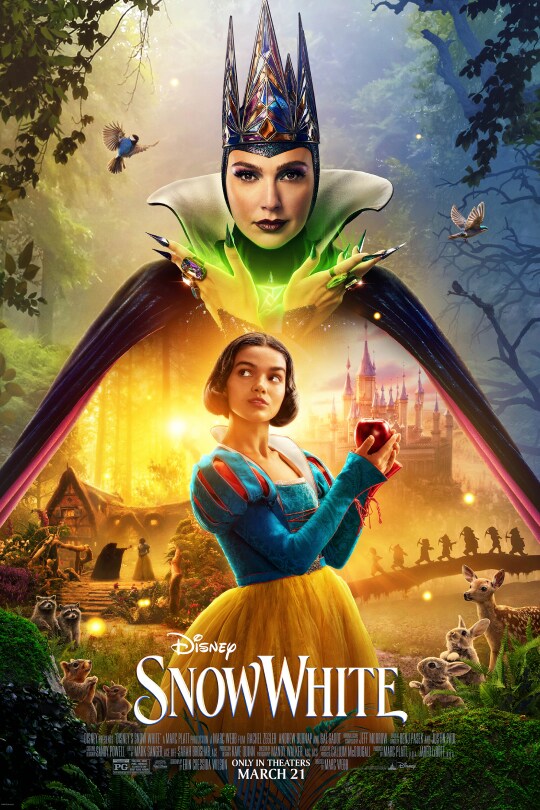Marc Webb’s musical fantasy film Snow White hit theatres on March 21, as the seventh live-action Disney princess film. My Tiktok and Instagram feeds have recently been filled with hate towards the film. The internet was abuzz with discontent regarding the film and its casting choices. Zegler was personally hit with racist backlash for being chosen to portray Snow White, as a Columbian-American woman. Social media didn’t see the West Side Story star fit for the role. In contrast, I saw some good reviews from reputable sources. Entertainment Weekly deemed Snow White “Disney’s best live-action remake yet.” Time asserts that the film “joins the ranks of the surprisingly pleasurable Disney remakes.” As a Disney kid growing up, I’ve always been fascinated by Disney princess films and their effect on the adolescent psyche. In my opinion, animated films promote unrealistic beauty standards and true love. The live action films demonstrate feminism and independence, themes that are relevant to young women today. I was curious to see whether praise or hate was warranted towards Snow White.
The film began with a narration by Dopey, depicting the picture-perfect childhood of Princess Snow White, (Rachel Zegler), until the Evil Queen,(Gal Gadot), seizes sole power of the kingdom, and forces Snow White to work as a maid in the castle. The Evil Queen rules tyrannically, and her vanity grows stronger everyday, thanks to her compliment-dispensing magic mirror. One day, however, the mirror tells the Evil Queen she is not the fairest of them all, as Snow White has taken the top spot. Jealous and consumed with anger, the Evil Queen orders a huntsman (Ansu Kabia), to kill Snow White. Ultimately, the huntsman can’t bring himself to do it and tells Snow White to run away.
Enter the seven dwarves and the charming Jonathan, played by Andrew Burnap. Jonathan is Snow White’s love interest, and he’s not a prince in shining armor, but a bandit on the run.
The delightful dwarves harmonize in the song “Heigh Ho,” which is followed by the fan favorite “Whistle While You Work,’’ in which Snow White teaches the dwarves teamwork. Back in the kingdom, the Evil Queen sings “All is Fair,” a power ballad, declaring her supremacy. The Evil Queen is informed of the huntsman’s failed attempt to kill Snow White and disguises herself as an oldwoman to trick Snow White into eating the infamous poison apple. Snow White is then rendered unconscious, and Jonathan gives her true love’s kiss.
The film’s tension mounts as the kingdom mutinies against the Evil Queen under Snow White’s leadership. The Evil Queen is then banished into the dark abyss behind her magic mirror as Snow White seizes her rightful place on the throne. The film wraps up with a joyous celebration in the ensemble number “Good Things Grow.”
The upbeat musical numbers carried the film for me, as I found the dry dialogue boring. Die-hard Snow White fans will most likely have noticed differences between the 1937 animated film and the 2025 version. I thought the changes were okay, but ultimately didn’t make me enjoy the film any more. The plot was predictable and there wasn’t anything outstanding about the film. Overall, I left the Prytania theatre feeling the same way I did as I entered: indifferent. Seems as though most of the audience felt the same, as the film grossed a measly $87 million in the box office and earned a 44 % score on Rotten Tomatoes.
A contributor to the film’s poor performance included the controversial politics of the cast. Gadot, Israeli-born, has been vocal about her support of Israel, while Zegler has announced she supports Palestine in the ongoing Israel-Hamas war. Adding fuel to the fire, the film was scrutinized for using CGI to create the dwarves, rather than hiring little people to portray them. I enjoyed the use of CGI. It contributed to the magical realism concept of the film.
Snow White was expected to be a fan favorite along with past Disney princess live-actions. It’s unfortunate that what was supposed to be a high grossing film was slammed for having bad press.
In my opinion, however, the film’s strongest aspect is its diverse cast. With Zegler, a Colombian woman, as Snow White, Gadot, an Israeli woman as the Evil Queen, and Kabia, an African-British man as the huntsman. I was surprised and delighted to see the varying demographics on screen. I would say this was the most notable aspect of the film. Snow White positively demonstrates the importance of diversity in the film industry.
Snow White emphasizes the notion that kindness and inner beauty triumph over vanity and jealousy. I’d rate the film a 5/10.







